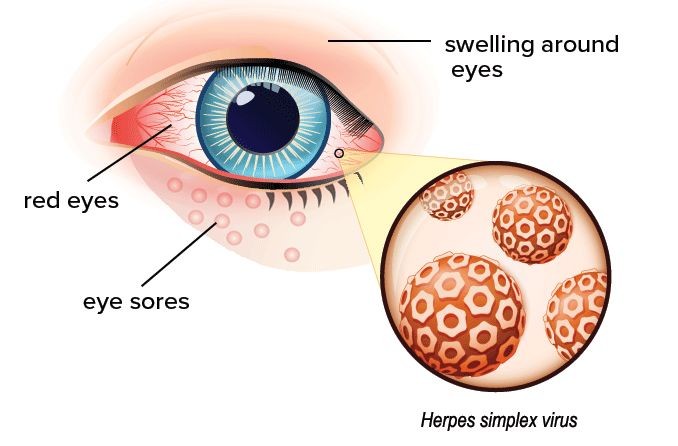
Contents
- 1 Eye Herpes (Ocular Herpes)
- 1.0.1 Causes of eye herpes
- 1.0.2 Risk factors for herpes eye infections
- 1.0.3 Signs and symptoms of herpes eye infections
- 1.0.4 Susceptible parts of the eyes
- 1.0.5 Contagiousness of ocular herpes
- 1.0.6 Transmission of ocular herpes
- 1.0.7 Incubation period for ocular herpes
- 1.0.8 Diagnosis and treatment of ocular herpes
- 1.0.9 Diagnostic procedures for herpes eye infections
- 1.0.10 Treatment options for herpes eye infections
- 1.0.11 Cure for ocular herpes
- 1.0.12 Prognosis of herpes eye infections
- 1.0.13 Risks and complications of untreated herpes eye infections
- 1.0.14 Prevention of herpes eye infections
Eye Herpes (Ocular Herpes)
An eye herpes and HZV infection often causes pain, blurred vision, redness, tearing, and light sensitivity in one eye.
There are different members of the herpes virus family, including herpes simplex virus-1 (HSV-1) and herpes simplex virus-2(HSV-2), herpes zoster (HZV or varicella-zoster virus/VZV), cytomegalovirus (CMV), and others.
Causes of eye herpes
The two types of herpes virus that commonly affect the eyes are herpes simplex virus-1 (HSV-1) (the same virus that causes cold sores) and varicella-zoster virus (VZV; herpes zoster) which causes chickenpox in childhood and shingles in adulthood.
Cytomegalovirus can also cause eye disease in immunocompromised individuals, such as HIV-infected patients with low T cell counts.
Risk factors for herpes eye infections
Although a large percentage of the population carries the HSV-1 virus, not everyone with the virus gets an eye infection.
When a person carrying the virus becomes immunocompromised (due to HIV, medications, age, or stress), the virus is more likely to become active and cause an eye infection.
In many cases, the frequency of eye infections appears to be random and not necessarily associated with stress or immune weakness.
Signs and symptoms of herpes eye infections
The most common signs and symptoms of ocular HSV and HZV infection include:
- Pain
- Blurred vision
- Redness
- Tearing
- Light sensitivity in one eye
Shingles rash with tiny blisters on the eyelids and forehead may also accompany HZV infection.
Susceptible parts of the eyes
All parts of the eye are susceptible to herpes viruses. Herpes ophthalmicus refers to herpes infection of any part of the eye.
HSV and HZV most commonly affect the cornea, causing a condition called herpetic keratitis. However, these viruses can also affect the skin of the eyelids, the uveal tissue (iris and choroid), and the retina. Therefore, a thorough eye exam is recommended to assess the extent of the infection.
Contagiousness of ocular herpes
Herpes can be contagious. People with active corneal herpes simplex and herpes zoster have live virus in their tears and skin vesicles. Careful hand washing is important, especially when in contact with unimmunized infants, children, or people with weakened immune systems.
Transmission of ocular herpes
In most cases, ocular herpes simplex is not transmitted from one eye to another. People acquire the virus through direct contact, but it often produces no initial signs or symptoms. The virus remains latent in the body’s nervous system and can reactivate months or years later, causing ocular herpes or a cold sore.
Herpes zoster virus is usually acquired through the air during chickenpox epidemics in childhood. Afterward, the virus can remain dormant for years before reactivating as shingles or HZV eye disease.
Incubation period for ocular herpes
The incubation period for ocular herpes can range from a few days to several decades.
IMAGES
Diagnosis and treatment of ocular herpes
Your primary care doctor usually makes an initial diagnosis, but individuals should follow up with an eye doctor. Special eye examination equipment allows for a more detailed assessment and tailored treatment plan.
Diagnostic procedures for herpes eye infections
Physicians usually diagnose herpes keratitis based on symptoms and signs alone.
Herpes keratitis often produces a distinct erosion of the outer cornea layer called a "dendrite." Physicians use blue light and a dye to see the dendrite under a slit-lamp microscope. In some cases, doctors may obtain a culture to confirm the diagnosis.
Healthcare professionals also closely examine the other eye tissues to assess the extent of infection.
Treatment options for herpes eye infections
Initial treatment involves antiviral medication, either topical (drops) or oral. In some cases, intravenous medication may be necessary.
Additional treatment options may include:
- Antiviral drugs: These drugs suppress the reproduction of the virus, reducing the duration and severity of the infection and the likelihood of recurrence.
- In some cases, antibiotic drops or ointment may be used to prevent secondary bacterial infections.
- If eye pressure increases due to inflammation or direct herpes virus infection, pressure-lowering medication may be prescribed.
- Inflammation of eye tissues may require anti-inflammatory medications such as steroids. Chronic or recurring inflammation may require multiple rounds of steroid treatment.
Cure for ocular herpes
Currently, there is no medication that can cure herpes. The viruses remain latent in the nervous system, and available antiviral medications only affect actively replicating viruses.
Prognosis of herpes eye infections
Most cases of herpes simplex keratitis resolve within a couple of weeks with antiviral therapy and cause little or no permanent damage. Deeper tissue layer infections may have a higher complication rate due to inflammation.
Herpes zoster involving the outer cornea layer may also resolve with antiviral therapy, but lingering pain is common. Both types of herpes eye infections can cause corneal scarring that may require surgery to correct.
Corneal nerve damage can lead to chronic numbness, dry eye, and corneal erosions or ulcers. Lubricating drops, punctual plugs, and eyelid surgery may help protect the cornea in these cases.
Frequent recurrences of HSV and HZV eye disease should prompt a medical checkup to rule out underlying conditions weakening the immune system.
Risks and complications of untreated herpes eye infections
Untreated herpes eye infections can lead to blindness, chronic pain, and loss of the eye. Timely treatment aims to reduce scarring, eye pressure problems, and direct damage to eye tissues.
Prevention of herpes eye infections
For patients with frequent recurrences, low-dose antiviral medication may be prescribed to reduce the frequency of outbreaks.
Currently, there is no vaccine against HSV. Vaccines for chickenpox and shingles may reduce the frequency and severity of shingles and HZV eye disease.
It is recommended that adults aged 60 and over receive the shingles vaccine. Research is ongoing to develop a means of eradicating the viruses in their latent states.
By clicking Submit, I agree to the MedicineNet’s Terms & Conditions & Privacy Policy and understand that I may opt out of MedicineNet’s subscriptions at any time.
Farooq, A. V., et al. "Herpes simplex epithelial and stromal keratitis: an epidemiologic update." Survey of Ophthalmology 57.5 (2012): 448-462.
Porter, Daniel. "What Is Herpes Keratitis?" American Academy of Ophthalmology. Apr. 1, 2020. .
Potts, A., G.J. Williams, J.A. Olson, K.G.J. Pollock, H. Murdoch, and J.C. Cameron. "Herpes zoster ophthalmicus reduction: implementation of shingles vaccination in the UK." Eye (Lond) 28.3 Mar. 2014: 247-248.


